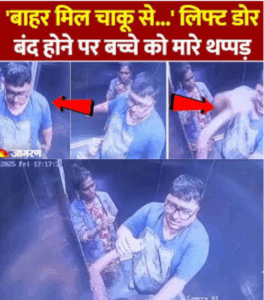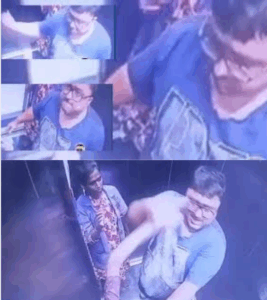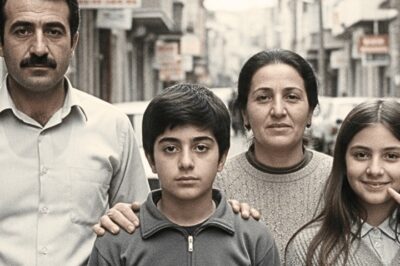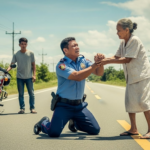Mumbai Thane Life Video: Friend’s father got angry because the lift door was closed, slapped the 12 year old child
In the bustling city of Thane, adjacent to Mumbai, an incident recently occurred that has left the community shocked and disturbed, reigniting concerns about child safety, anger management, and the responsibilities of adults in society. The episode, captured on CCTV and widely circulated on social media, involved a 12-year-old boy who became the victim of a violent outburst by an adult in the residential area of Palegaon, Ambernath. The boy’s only fault was pressing the “close door” button in an elevator, unaware that someone was waiting to enter. What followed was a sequence of events that not only traumatized the child but also raised broader questions about civility, empathy, and accountability in modern urban life.
According to eyewitness accounts and police reports, the incident unfolded in a multi-story building where the boy, identified as Tyagi Pandey, was taking the elevator down. As the lift reached the ninth floor, Tyagi did not see anyone waiting and, in a routine act, pressed the button to close the door. Unknown to him, a man was waiting just outside, growing increasingly agitated as the doors began to shut. The man managed to stop the doors and entered the lift, visibly enraged by what he perceived as a slight or a deliberate act of rudeness.
What happened next was both shocking and deeply distressing. In a fit of anger, the man began to slap the boy repeatedly, delivering blow after blow with little regard for the child’s pleas or attempts to defend himself. The violence did not stop at slapping; as the boy tried to protect himself, the man bit his hand, escalating the assault to a level that left even bystanders stunned. The entire episode was recorded by the building’s CCTV camera, and the footage clearly shows the man’s aggression and the boy’s helplessness. Also present in the lift was a woman, who, taken aback by the sudden violence, questioned the man’s actions and tried to understand what was happening. She asked the man why he was hitting the child and tried to comfort the boy, but her intervention did little to stop the assault.
In the aftermath of the incident, the boy recounted his ordeal to the media and the police. He explained that he had simply pressed the close door button because he did not see anyone waiting outside. The man, who turned out to be the father of one of Tyagi’s friends, entered the lift in a rage and began to beat him. The boy, still shaken by the experience, described how the man not only slapped him repeatedly but also bit his hand and threatened him with further violence, saying, “I’ll meet you outside and stab you with a knife.” For a 12-year-old, such threats and physical assault are traumatizing, especially when they come from an adult known to him as his friend’s father.
The incident quickly came to the attention of the boy’s parents, who were understandably horrified by what had happened to their son. They wasted no time in approaching the local police and filing a formal complaint against the man. The police responded by registering a case and launching an investigation into the matter. They reviewed the CCTV footage, spoke to witnesses, and began piecing together the sequence of events that led to the violent outburst.

What makes this case particularly disturbing is the relationship between the victim and the accused. The man who attacked Tyagi was not a stranger; he was the father of Tyagi’s friend, someone the boy would have seen as a familiar and perhaps even trusted adult. The betrayal of that trust, coupled with the sheer brutality of the attack, left the boy and his family deeply shaken. The boy himself expressed his confusion and disbelief, saying he could not understand why his friend’s father would behave in such a manner. He had done nothing to provoke the assault, and the man had not even attempted to explain his anger before launching into violence.
The wider community, upon learning of the incident, reacted with outrage and concern. Parents in the building and the surrounding area began to question the safety of their children, not just in public spaces but even within the supposedly secure confines of their own homes. The fact that such violence could erupt over something as trivial as an elevator door closing was a sobering reminder of the volatility that sometimes lurks beneath the surface of everyday interactions.
The incident also sparked a broader discussion about the responsibilities of adults in dealing with children, particularly in moments of frustration or annoyance. While it is natural for people to experience irritation in crowded urban settings, resorting to physical violence—especially against a child—is never justified. The episode highlighted the need for greater emotional regulation, empathy, and self-control among adults, as well as the importance of modeling appropriate behavior for younger generations.
From a legal and societal perspective, the case raised important questions about the protection of children and the consequences for those who harm them. The police investigation was expected to determine whether the man’s actions constituted assault, child abuse, or other criminal offenses. The outcome of the case would send a message to the community about the seriousness with which such incidents are treated and the imperative to hold perpetrators accountable, regardless of their social standing or relationships.
The role of technology, specifically CCTV, was also significant in this case. The presence of surveillance cameras meant that there was clear, objective evidence of what transpired in the lift, making it easier for the authorities to establish the facts and pursue justice. The footage also served as a powerful reminder of the value of surveillance in enhancing security and accountability in residential complexes, though it also raised questions about privacy and the balance between monitoring and trust.

As the investigation progressed, media coverage of the incident brought the story to a wider audience, prompting discussions on news platforms, social media, and in households across the city. Many commentators emphasized the need for educational programs to teach anger management and conflict resolution, both for adults and children. Others called for stricter enforcement of laws protecting minors and harsher penalties for those found guilty of violence against children.
The psychological impact on the boy, Tyagi, was another area of concern. Experts noted that experiences of violence and betrayal by trusted adults can have lasting effects on a child’s sense of safety and well-being. Counseling and support would be essential to help him process the trauma and regain his confidence. The incident also served as a wake-up call for parents and guardians to be vigilant about their children’s interactions and to foster open communication so that children feel comfortable reporting any incidents of abuse or mistreatment.
In reflecting on the incident, many in the community expressed a sense of collective responsibility. While the actions of one individual had caused harm, the response of others—such as the woman in the lift who intervened, the parents who sought justice, and the police who acted promptly—demonstrated the potential for solidarity and support in the face of wrongdoing. The hope was that the case would not only result in justice for Tyagi but also serve as a catalyst for greater awareness and prevention of similar incidents in the future.
Ultimately, the episode in Ambernath’s Palegaon neighborhood was a stark reminder of the challenges and pressures of urban life, where misunderstandings can quickly escalate and where the boundaries of acceptable behavior must be vigilantly maintained. It underscored the need for compassion, patience, and respect in all interactions, especially between adults and children. By confronting the issue head-on, supporting the victim, and holding the aggressor accountable, the community could begin to heal and reaffirm its commitment to the safety and dignity of every child.
As the story continued to unfold, attention turned to the legal proceedings and the measures taken by the building’s management to prevent future incidents. Some residents suggested installing clearer signage in lifts, educating residents about elevator etiquette, and organizing workshops on child safety and conflict resolution. Others advocated for community-building activities to foster trust and understanding among neighbors.
In conclusion, the assault on a 12-year-old boy in Thane was more than just an isolated act of violence; it was a reflection of deeper societal issues that demand attention and action. The incident challenged assumptions about safety in residential communities, highlighted the vulnerabilities of children, and called into question the emotional maturity of adults entrusted with their care. By learning from this painful episode and working collectively to address its underlying causes, the community could hope to build a safer, kinder, and more resilient environment for all its members.
Play video :
News
TEMİZLİKÇİ, PATRONUN ÇÖPÜNDE ŞÜPHELİ BİR ŞEY BULUR… VE HERKESİ KURTARIR!
TEMİZLİKÇİ, PATRONUN ÇÖPÜNDE ŞÜPHELİ BİR ŞEY BULUR… VE HERKESİ KURTARIR! . . . Temizlikçi, Patronun Çöpünde Şüpheli Bir Şey Bulur……
Mafya Patronunun Bebeği Dokunulduğunda Durmadan Ağlıyordu — Ta ki Bir Hemşire Akıl almaz Olanı Yapan
Mafya Patronunun Bebeği Dokunulduğunda Durmadan Ağlıyordu — Ta ki Bir Hemşire Akıl almaz Olanı Yapan . Mafya Patronunun Bebeği Dokunulduğunda…
Harp Okulu Skandalı Sınırdaki Yolsuzluk Çetesini Kadın General Bitirdi
Harp Okulu Skandalı Sınırdaki Yolsuzluk Çetesini Kadın General Bitirdi . . . Harp Okulu Skandalı: Sınırdaki Yolsuzluk Çetesini Bitiren Kadın…
Mart 1982’de Ankara’da bir aile iz bırakmadan kayboldu. 25 yıl sonra bulunan günlük her şeyi değişti
Mart 1982’de Ankara’da bir aile iz bırakmadan kayboldu. 25 yıl sonra bulunan günlük her şeyi değişti . . . Mart…
Bu Düğün Fotoğrafına Dikkatli Bakın: Koca Gelinin Kolunu Neden Bu Kadar Acımasızca Tutuyor?
Bu Düğün Fotoğrafına Dikkatli Bakın: Koca Gelinin Kolunu Neden Bu Kadar Acımasızca Tutuyor? . . . Bu Düğün Fotoğrafına Dikkatli…
KÖR BİR KADIN, KİBİRLİ BİR MİLYONERİ SANAL SEVGİLİSİYLE KARIŞTIRIR… VE O ARTIK ASLA AYNI OLMAZ!
KÖR BİR KADIN, KİBİRLİ BİR MİLYONERİ SANAL SEVGİLİSİYLE KARIŞTIRIR… VE O ARTIK ASLA AYNI OLMAZ! . . Kör Bir Kadın,…
End of content
No more pages to load












